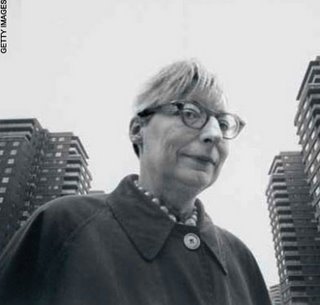My City Was Gone

It's like Sybil around here sometimes, isn't it? Forgive me. Anyway, I just discovered that Jane Jacobs, the author of The Death and Life of American Cities, passed away today. She was 89, and though was born in Scranton, PA, and lived for a time in the West Village, which she writes about lovingly in the aforementioned book, she died in Toronto. She moved there when she didn't want her taxes supporting the Vietnam War. That hit home, as I type, being that we just passed the ides of April. The Festival of the IRS. Should we start a holiday tradition, to coincide with Passover, where people gather around tables to eat bitter herbs and unleavened bread, the only thing we can afford to eat now that we wrote our check out?
But I digress.
Jacobs' book should be given to everyone running a city, or even a suburb. I mean, they wouldn't read it, of course, but I feel if they did read that book, and thought about the small scales she advocated, council members and mayors might get less hoodwinked into thinking that sports stadiums (this means you, Ratner, you evil, evil man) and malls and chain stores were what people wanted out of cities. Perhaps Bloomberg would even wrest the control of the MTA from the state, the way he wrested control of the schools from the city, whatever the hell that really means. I think about this constantly, but I feel in the last year the process has been speeding up. I look at storefronts around Park Slope and Cobble Hill and Carroll Gardens, and if there's a whiff of age or slight obsolesence (shoe store that's been there for decades, Italian bakeries making cakes like the ones you would get as a kid in the suburbs, Puerto Rican/Dominican restaurants serving longtime residents chicken soup and cafe con leches) you can almost be sure you won't see it within the next week.
From the AP bio, via the Times:
Her impact transcended borders. Basing her findings on deep, eclectic reading and firsthand observation, Jacobs challenged assumptions she believed damaged modern cities -- that neighborhoods should be isolated from each other, that an empty street was safer than a crowded one, that the car represented progress over the pedestrian.
Her priorities were for integrated, manageable communities, for diversity of people, transportation, architecture and commerce. She also believed that economies need to be self-sustaining and self-renewing, relying on local initiative instead of centralized bureaucracies....
Jacobs thought cities suffered from an anti-city bias among planners, the romanticization of a more rural way of life. Because of this, she wrote, vital communities were being torn down simply because they were "crowded," other neighborhoods were fatally isolated and parks were being constructed without regard to their surrounding environment.
I do feel that currently people who run cities have forgotten what made them cities in the first place--the crowdedness, the unpleasantness, the oddball citizens and corners, the small, the iconoclastic, the illicit, the flourishing of the somewhat superfluous and irrelevant. If cities can't and won't give harbor to these things, where else can they go? Who else will? I'm worried.

<< Home